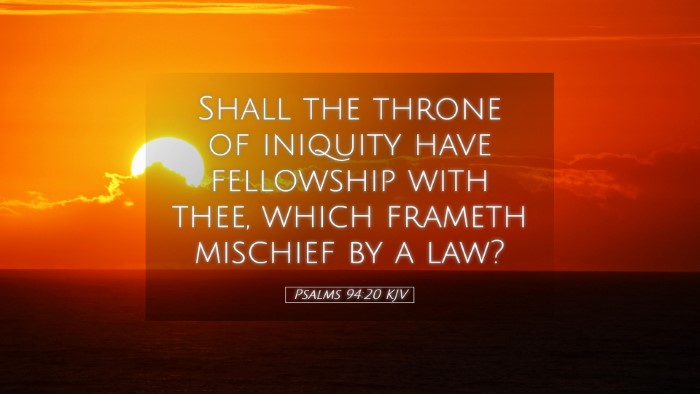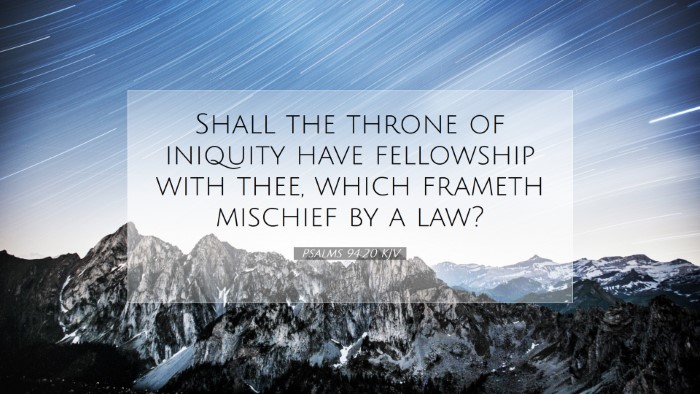Commentary on Psalms 94:20
Psalms 94:20 states, "Shall the throne of iniquity have fellowship with thee, which frameth mischief by a law?" This verse raises profound questions about justice, morality, and the nature of governance, making it pertinent for pastors, students, theologians, and Bible scholars.
Introduction to the Verse
This Psalm is a cry for justice and a declaration of God's sovereignty over human affairs. The psalmist is in deep trouble and reflects on the apparent triumph of wickedness. In this specific verse, a rhetorical question is posed that underscores the impossibility of immorality standing in communion with divine justice.
Contextual Analysis
The context of Psalm 94 reveals a tumultuous time for the Israelite community, filled with oppression and suffering under unjust rulers. The Psalmist pleads for God's intervention against those who misuse power and oppress the righteous.
Historical Context
The historical backdrop likely refers to situations that reflected the corruption of the judiciary or governance in ancient Israel, where the rulers displayed iniquity instead of justice. Understanding this context enhances the depth of Psalm 94:20.
Insights from Commentators
-
Matthew Henry:
Henry emphasizes the boldness of the psalmist in confronting the moral contradictions of society. He notes that the "throne of iniquity" symbolizes authority used to legitimize evil acts. According to Henry, the psalmist is asserting that no corrupted human institution can claim fellowship with a holy God.
-
Albert Barnes:
Barnes elaborates on the nature of "mischief framed by law." He interprets this as a stark reminder that laws can be twisted to serve unjust purposes. For Barnes, this verse serves as a warning to the faithful that just because something is enacted as 'law' does not necessarily mean it is just in the eyes of God.
-
Adam Clarke:
Clarke discusses the moral implications of misplaced trust in human authority. He stresses that the psalmist’s heartache reflects the sense of betrayal felt when those in power misuse their positions. Clarke posits that God’s righteousness cannot coexist with the unholy actions perpetrated under the guise of lawful rule.
Theological Implications
From a theological perspective, Psalm 94:20 raises vital considerations regarding the nature of God's justice and the integrity of human governance. It invites believers to examine the following themes:
- The Nature of Justice: The verse stresses that divine justice transcends human laws. True justice aligns with God’s character, and any earthly authority that diverges from this is ultimately an affront to God.
- The Call for Righteousness: The verse is a call to the faithful to trust in God's sovereign judgments and to work towards justice in their societies, turning away from any iniquitous practices.
- The Role of the Believer: Believers are reminded of their responsibility to speak out against evil laws that contradict God's righteousness, echoing the psalmist's role as an advocate for justice.
Practical Applications
In practical ministry, this verse encourages reflection and action among believers:
- Advocacy for Justice: Pastors can emphasize the importance of standing against unjust laws and advocating for policies that reflect biblical justice.
- Education and Awareness: Equip congregants with biblical teaching on justice and righteousness, promoting discernment in societal issues.
- Prayer for Leaders: Encourage prayer for those in authority to align their decisions with God’s will rather than the whims of society.
- Reflection on Authority: Challenge the faithful to evaluate the authority structures in their lives and communities, ensuring they align with godly principles.
Conclusion
Psalms 94:20 serves as a poignant reminder of the divergence between divine expectations and human actions. For those in positions of teaching and leadership, the insights from the Psalm provide a fertile ground for discussions around justice, authority, and the character of God. It is an exhortation to cling to God’s standards in a world rife with moral compromise.


